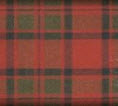Scottish Ancestors and Possible Clan Associations
From Wikipedia:
The word clan is derived from the Gaelic word "clanna," meaning children...Historically, a clan was made up of everyone who lived on the chief's territory, or on territory of those who owed allegiance to the said chief. Through time, with the constant changes of "clan boundaries", migration or regime changes, clans would be made up of large numbers of members who were unrelated and who bore different surnames. Often, those living on a chief's lands would, over time, adopt the clan surname. A chief could add to his clan by adopting other families, and also had the legal right to outlaw anyone from his clan, including members of his own family.
Today, anyone who has the chief's surname is automatically considered to be a member of the chief's clan, and in modern times acceptance to a clan is fairly broad. For instance the Chief of Clan Campbell has said that he is prepared to accept as members of Clan Campbell all those of Scottish descent who are prepared to acknowledge him as their Chief. This very much follows what actually happened in past times when 'broken men' - those without a chief - attached themselves by his permission to a chief and became his men.
View a Clan Land Map
| Clan Mackay |  |
 |
 |
 |
| Tartans | Ancient | Modern | Weathered | Dress |
| Clan MacThomas |  |
 |
| Tartans | Ancient | Modern |
| Clan Thom(p)son |  |
 |
| Tartans | Dress Blue | Hunting |
| Clan MacTavish |  |
 |
| Tartans | Ancient | Hunting |
| Clan Campbell |  |
 |
| Tartans | Ancient | Bl. Watch |
| Clan MacIntosh |  |
 |
|||
| Tartans | Ancient | Modern | |||
| Clan Macpherson |  |
 |
 |
 |
 |
| Tartans | Ancient | Modern | Hunting | Dress | Weathered |
| Clan Chattan |  |
||||
| Tartans | Chief |
Because at this point we have so little definitive information about Alexander Skinner (just that he was born in Scotland), we can't know if he was from the Highlands region at all, but because of his associations in Canada, it seems quite possible that he was, or was of a group that relocated to the Aberdeen area.
| Clan Gregor |  |
 |
 |
 |
| Tartans | Red&Blk | Red&Grn | Glengyle | Cardney |